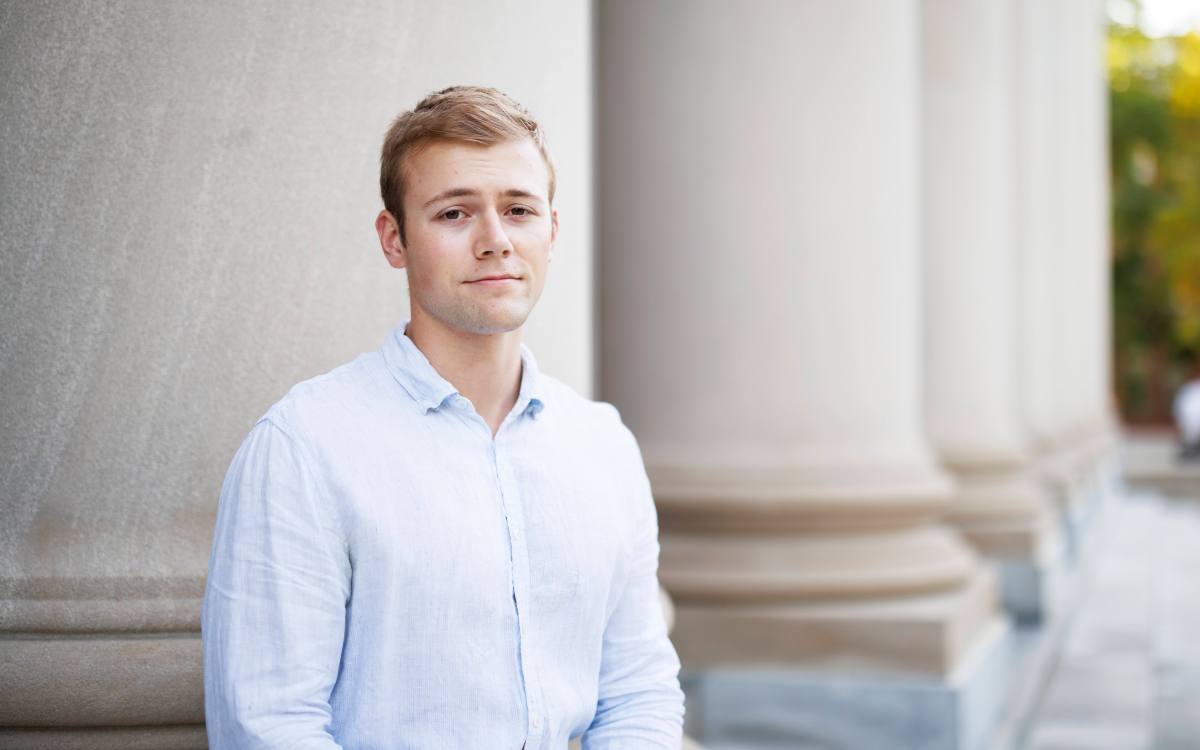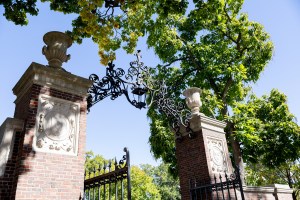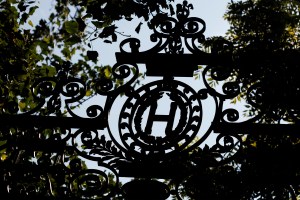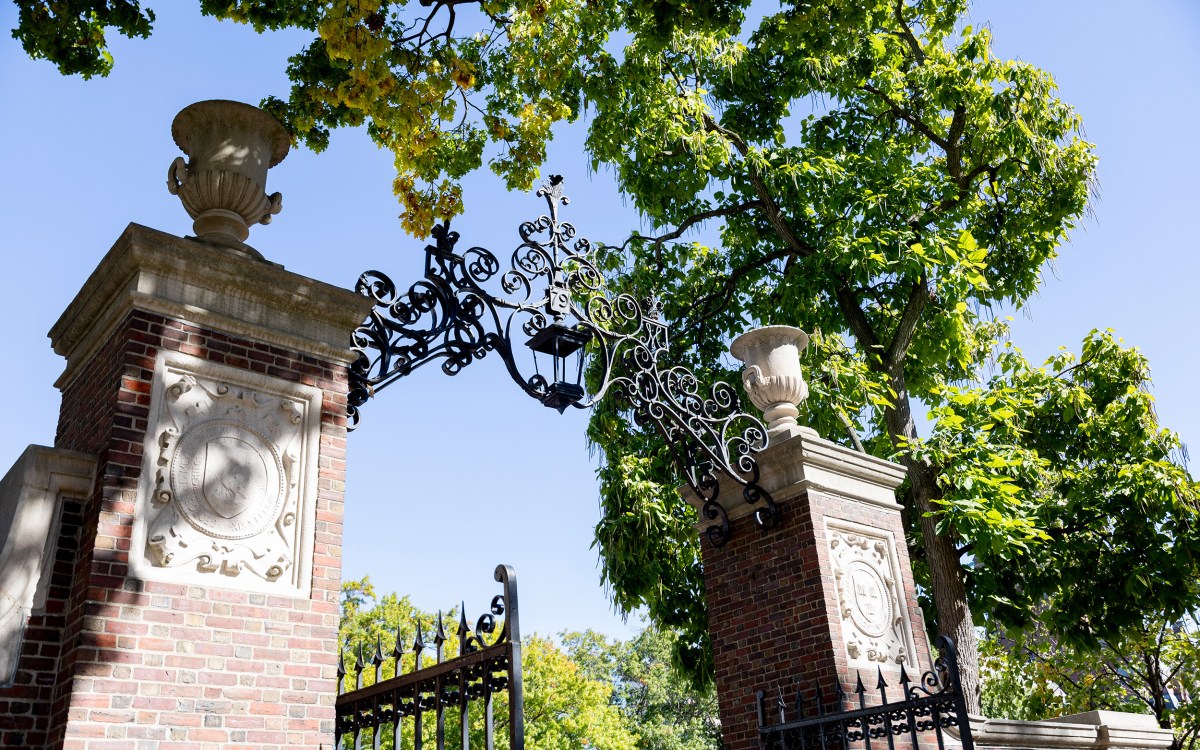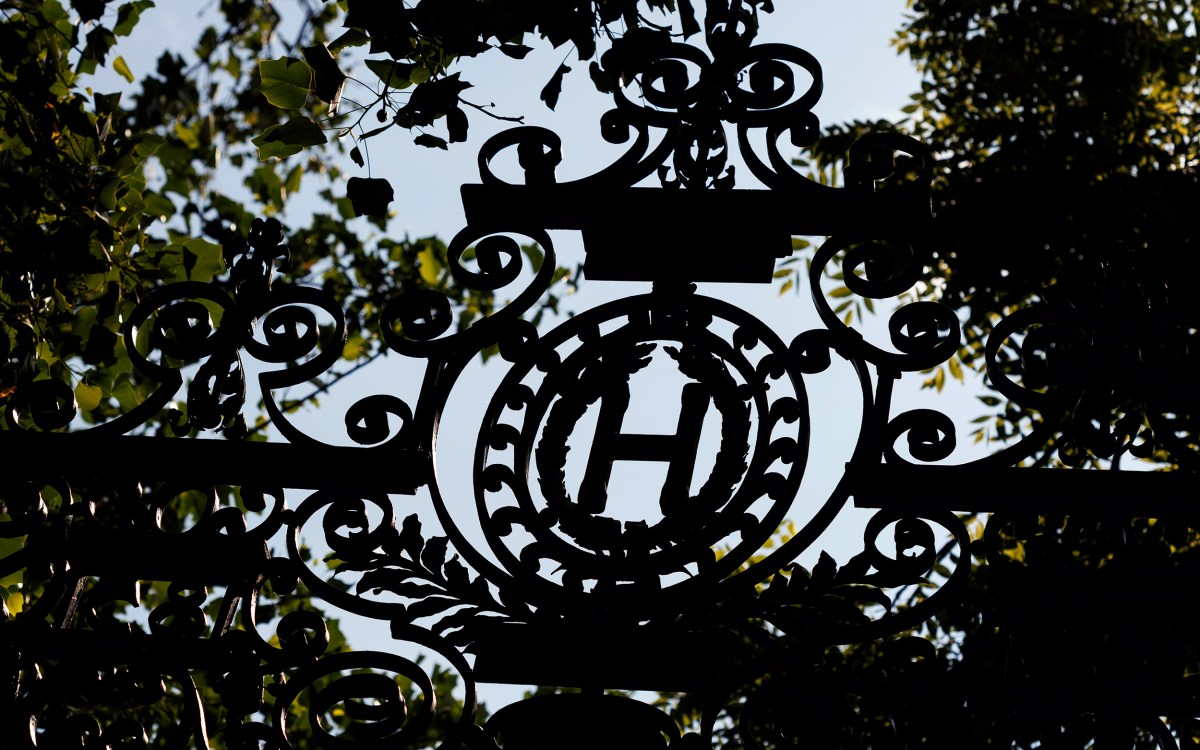Want better democracy? Let’s talk
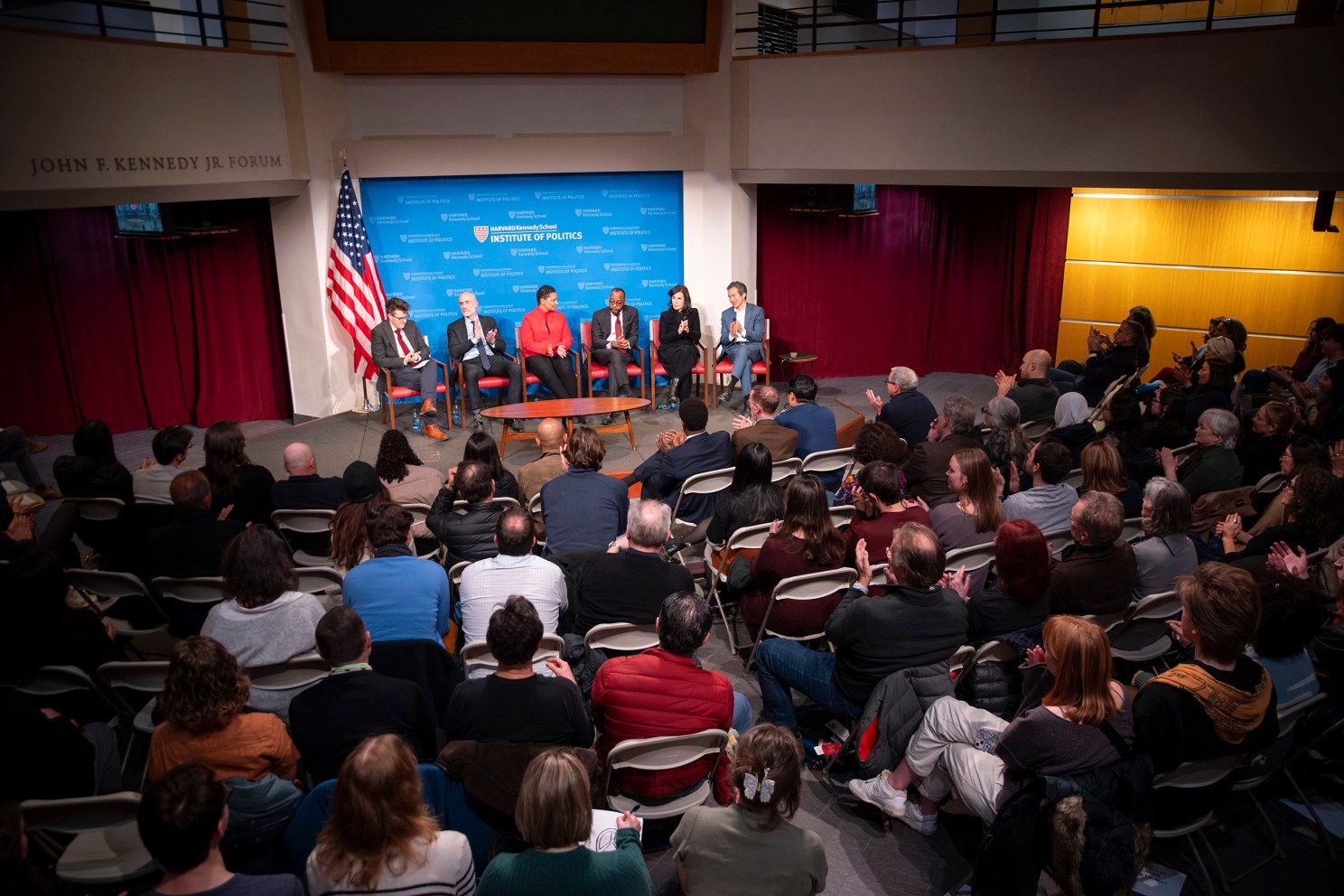
Panelists Erica Chenoweth (from left), Arthur Brooks, Danielle Allen, Cornell Brooks, Eliana La Ferrara, and Archon Fung address “Dissent, Disagreement, and Democracy” at the JFK Forum.
Photos by Niles Singer/Harvard Staff Photographer
Kennedy School panel wrestles with how to repair divides by creating culture of candid, constructive conversation, commitment to system
Harvard’s 2024 spring term kicks off with events across the University designed to enhance our ability to engage in respectful and robust debate.
The original framework for American democracy was hammered out amid heated disagreement and rigorous debate. Now, in this period of hardening political and social schisms, what’s hampering progress isn’t that we disagree, but how we do it or worse, try to avoid it altogether, panelists at Harvard Kennedy School argued Thursday evening.
The discussion took place as the University kicked off “Harvard Dialogues,” a new series of events to build more open and respectful communication across campus. The talk sprang from a recommendation last fall by a Kennedy School working group of faculty, students, and staff to provide more opportunities for dialogue dealing with controversial topics as part of the School’s focus on improving public policy and leadership training.
“Given its mission, HKS can and must lead in addressing the deep divisions that exist in our societies today, and we must also strengthen our own norms, practices, and culture around candid and constructive conversation,” said moderator Erica Chenoweth, the HKS Academic Dean for Faculty Engagement and Frank Stanton Professor of the First Amendment, who led the working group.
“This is the crisis that we’re having in academia today: We’re narrowing the range of acceptable opinion, and we’re canceling the people who don’t hold those opinions.”
Arthur Brooks
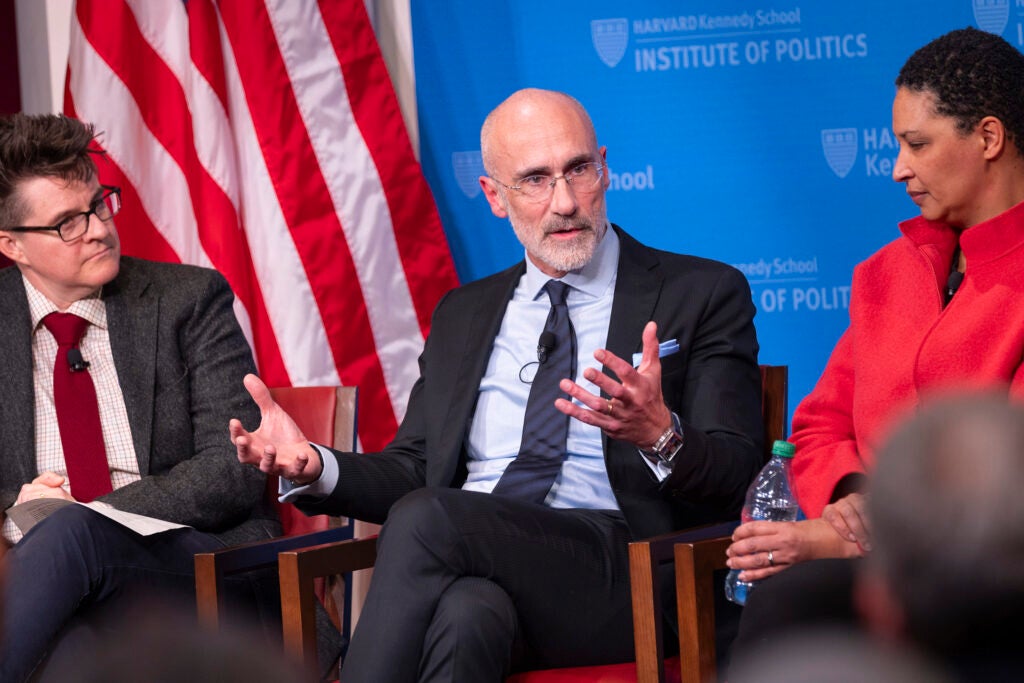
“The importance of discourse in a democracy is that it is a process of persuasion and deliberation, to find ways of compromise, to find areas of agreement, maybe even to change our minds and to economize … on the extent of disagreement,” said Archon Fung, Winthrop Laflin McCormack Professor of Citizenship and Self-Government and director of the Ash Center for Democratic Governance and Innovation at HKS.
However, he reminded, democracy comes “at a cost.” Citizens must be willing to accept the results when other viewpoints prevail at the ballot box and in the marketplace of ideas. An unwillingness to do so and the desire to see some powerful figure, like a president or a court, ensure that certain views prevail is a sign that we’ve become “justice authoritarians,” Fung said.
Higher education can lay the groundwork for better democratic practices. Campuses are where people come together to try to better understand the world and those around them and to put forward reasoned ideas and proposals and then persuade each other, said Danielle Allen, James Bryant Conant University Professor and director of the Allen Lab for Democracy Renovation.
To do that requires meeting three fundamental criteria.
“As Aristotle would say, persuading one another is about logos — reasoning. It’s about ethos — proving ourselves trustworthy to the people around us. And pathos — proving that we have goodwill to the people around us, that we are committed fundamentally to their basic human rights.”
“Academic freedom” doesn’t mean saying whatever we want, whenever and wherever we want, Allen said. It’s the rules of the game for what happens in the classroom, the library, and other venues of learning.
“What matters is the quality of the debate that you have in those academic spaces. That is why protecting classrooms from disruption is so important, because protecting classrooms from protest is actually about protecting academic freedom, so that that debate can happen,” she said.
“If you genuinely care about the community you’re in, you choose to care about your opponents. You choose to be responsible. That imposes a certain level of discipline.”
Cornell Brooks
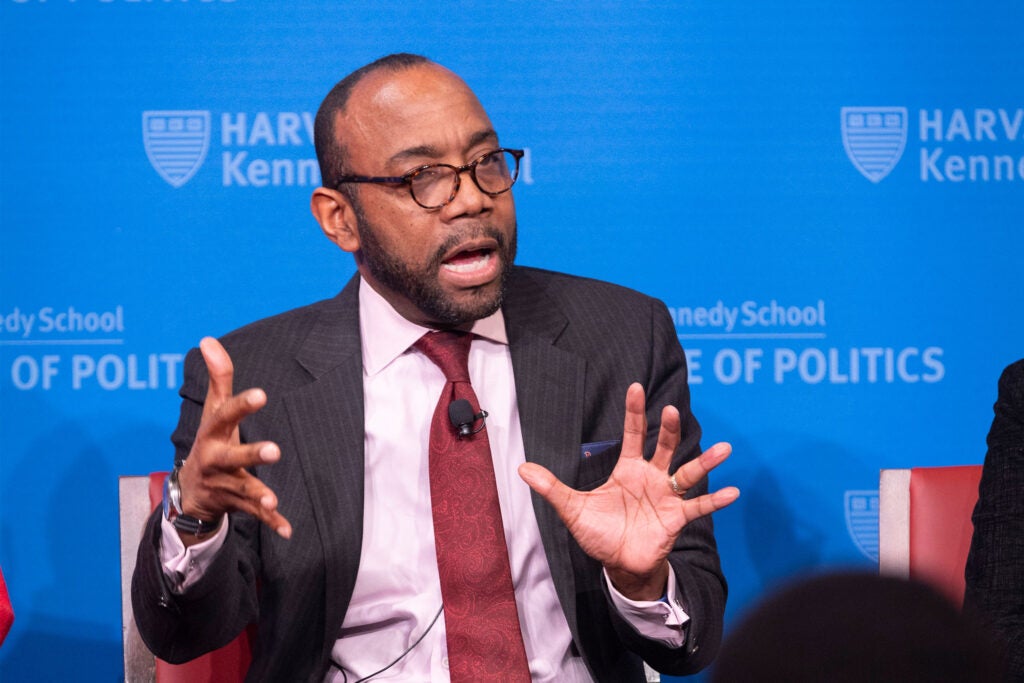
Avoidance of conflict is counterproductive. Arthur Brooks, Parker Gilbert Montgomery Professor of the Practice of Public and Nonprofit Leadership at HKS and a professor of management practice at Harvard Business School, said the tendency to give in to the human impulse to avoid things that make us feel bad or uncomfortable “infects” intellectual life at American universities.
“This is the crisis that we’re having in academia today: We’re narrowing the range of acceptable opinion, and we’re canceling the people who don’t hold those opinions,” said Brooks.
He likened college to an intellectual “gym” where instead of avoiding disagreements, students should test their ideas against the best ideological competitors they can find in order to become more skillful and to learn to work through feelings of discomfort.
“We’re going in the wrong direction for happiness by protecting ourselves,” he said.
Cornell Brooks, Hauser Professor of the Practice of Nonprofit Organizations and professor of the practice of public leadership and social justice at HKS, rejected the notion that feeling “triggered” justifies whatever action taken in response.
“If you genuinely care about the community you’re in, you choose to care about your opponents. You choose to be responsible. That imposes a certain level of discipline. You cannot afford to be triggered for too long. You’re accountable to other people. You have to show up, including for yourself and your own sense of integrity,” said Brooks, a former president and CEO of the NAACP and an ordained minister.
Brooks said young people today face “generationally unprecedented” challenges.
“I hear people talking about ‘This generation is soft. They’re snowflakes.’ No. People care deeply. It’s a matter of how you channel your sense of caring and accompanying your sense of caring and compassion with a deep sense of discipline. You care enough to protect yourself; you care enough to engage in self-care; you care enough to extend care to others.”
